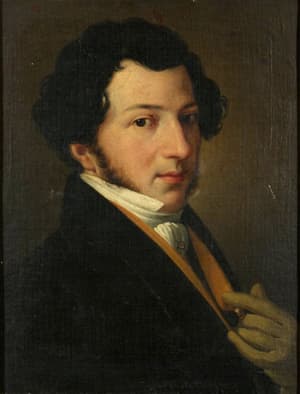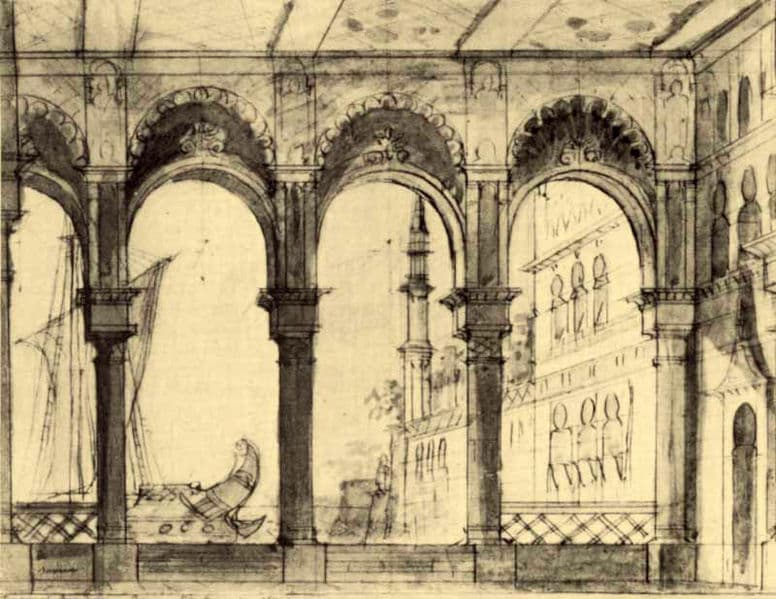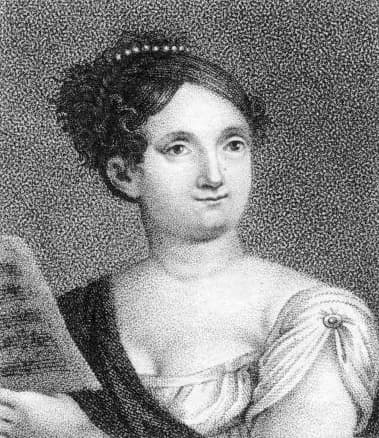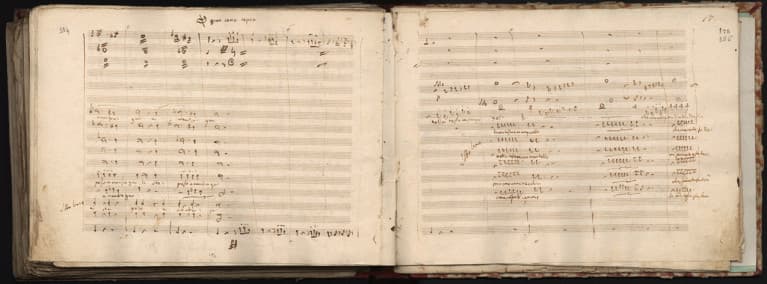L’Italiana in Algeri (The Italian Girl in Algiers) is Gioachino Rossini’s first buffo masterpiece in a fully-fledged two-act form, and it is one of the greatest comic masterpieces ever created.

The young Gioachino Rossini, circa 1815
Based on a libretto by Angelo Anelli, and specifically written for the San Benedetto Theatre in Venice, the premiere on 22 May 1813 was an immediate triumph. The resounding success of the work was partly due to the fact that the cast featured two of the most celebrated singers of the day for whom Rossini had already written important roles, Marietta Marcolini (Isabella) and Filippo Galli (Mustapha). Marie-Henri Beyle, better known by his pen name “Stendhal,” considered it “a perfect model of opera buffa, for the balance of comic and sentimental aspects, the extreme rapidity in the progression of the action and its total lack of emphasis.” To be sure, given the absolutely dazzling musical qualities of the score, it is one of the pinnacles of Rossini’s comic theatre.
Rossini: L’Italiana in Algeri, “Overture”
Paradoxically, the failure of Rossini’s own La pietra del paragone with Venetian audiences prompted a crisis in the schedule of the Teatro San Benedetto in April 1831. And when a promised opera by Carlo Coccia was not forthcoming, the Theatre commissioned Rossini to re-work Anelli’s libretto for L’Italiana in Algeri, first set to music by Luigi Mosca (1775-1824) for La Scala, Milan, in August 1808.
Gioachino Rossini’s L’Italiana in Algeri libretto cover
Rossini completed the score in 27 days, and some audience members during the premier suggested that it was merely “a rehash of Mosca and secondhand Rossini.” As a scholar writes, “nothing could be further from the truth, as informed Venetian critical opinion rapidly acknowledged. This is not only one of Rossini’s most brilliant scores but also one of his most original, with most of the music, including the famous overture, freshly written by him.” For musicologists, “Rossini created a type of obsessive comedy that makes us think about that unlikely mechanism which was to be identified in the cinematographic language of the old silent comedy films, where the visual rhythm and the ‘crescendo’ seem to move along the lines of the same necessity and expressive coherence as in Rossini’s comic opera, the logic or plausibility of the action counting for little.”
Gioachino Rossini: L’Italiana in Algeri (The Italian Girl in Algiers) – Act I Scene 1: Introduzione: Serenate il mesto ciglio (Giuliana Tavolaccini, soprano; Miti Truccato Pace, mezzo-soprano; Paolo Montarsolo, bass; Fernando Corena, baritone; Fiorentino Maggio Musicale Chorus; Fiorentino Maggio Musicale Orchestra; Silvio Varviso, cond.)
Gioachino Rossini: L’Italiana in Algeri (The Italian Girl in Algiers) – Act I Scene 4: Cruda sorte! Amor tiranno! (Teresa Berganza, mezzo-soprano; Fiorentino Maggio Musicale Chorus; Fiorentino Maggio Musicale Orchestra; Silvio Varviso, cond.)

Set design by Francesco Bagnara, 1813
The opera unfolds at a dizzying speed of action, and it contains an element that is wholly new for the Italian stages of the day; pervasive, and at times, explicit sexual allusions. The action takes place at the seaside palace of sultan Mustapha in Algiers. His wife Elvira is decidedly unhappy, and Mustapha decides to give her to Lindoro, a young Italian at the court. He then orders captain Haly to provide him with an Italian woman. Lindoro meanwhile is longing for Isabella, who was supposedly captured by pirates. Meanwhile, a shipwreck is spotted and Haly’s pirates find Isabella arriving on shore. She laments the fact that she can no longer search for her lost fiancé, Lindoro, but she is highly confident in her skill in taming men. The pirates also seize Taddeo, an aging admirer of Isabella’s and try to sell him into slavery. However, he claims to be Isabella’s uncle and cannot leave her. The pirates rejoice in having captured Italians, and of having found a new wife for Mustapha’s harem.
Gioachino Rossini: L’Italiana in Algeri (The Italian Girl in Algiers) – Act I Scene 5: Ai capricci della sorte (Teresa Berganza, mezzo-soprano; Rolando Panerai, baritone; Fiorentino Maggio Musicale Orchestra; Silvio Varviso, cond.)
Gioachino Rossini: L’Italiana in Algeri (The Italian Girl in Algiers) – Act I Scene 12: Quartettino nel Finale I: Vo’ star con mia nipote (Giuliana Tavolaccini, soprano; Teresa Berganza, mezzo-soprano; Miti Truccato Pace, mezzo-soprano; Luigi Alva, tenor; Rolando Panerai, baritone; Fernando Corena, baritone; Paolo Montarsolo, bass; Fiorentino Maggio Musicale Orchestra; Silvio Varviso, cond.)

Marietta Marcolini by Giovanni Antonio Sasso
Mustapha has decreed that Lindoro can return to Italy, if he will take Elvira with him. He accepts but asserts that he will only marry her once they reach Italy. Meanwhile, Elvira sees no advantage in departing with Lindoro, as she still loves her husband. Haly announced the capture of an Italian woman, and Mustapha is elated. He welcomes Isabella in the main hall of the palace with a grand ceremony, but she finds him ridiculous and revolting. While Mustapha is besotted, Isabella makes it clear that she can deal with him. Taddeo is making a scene, and Elvira and Lindoro arrive to say good-bye before departing for Italy. Lindoro and Isabella instantly recognize each other, and Isabella insists that Mustapha cannot banish his wife and that Lindoro must stay as her own personal servant.
Gioachino Rossini: L’Italiana in Algeri (The Italian Girl in Algiers) – Act II Scene 1: Uno stupido, uno stolto (Giuliana Tavolaccini, soprano; Miti Truccato Pace, mezzo-soprano; Paolo Montarsolo, bass; Fiorentino Maggio Musicale Chorus; Fiorentino Maggio Musicale Orchestra; Silvio Varviso, cond.)
Gioachino Rossini: L’Italiana in Algeri (The Italian Girl in Algiers) – Act II Scene 4: Ho un gran peso sulla testa (Fernando Corena, baritone; Rolando Panerai, baritone; Fiorentino Maggio Musicale Chorus; Fiorentino Maggio Musicale Orchestra; Silvio Varviso, cond.)
There is general contempt amongst the harem of how easily the Italian woman has managed to enchant Mustapha, which gives Elvira hope of regaining his love. Isabella is upset that Lindoro had agreed to escape with Elvira, but he reassures her of his loyalty. Mustapha meanwhile is making Taddeo his personal bodyguard in exchange for helping to gain Isabella’s affection. Taddeo is dressed in Turkish ceremonial garb and accepts the compulsory honor. Isabella also dresses in Turkish dress, and she tells Elvira to be more assertive. Isabella knows that Mustapha is listening in the background, and she makes him wait with her servant Lindoro as a go-between. She finally presents herself to Mustapha, and lectures him on treating his wife more gently. Mustapha, greatly annoyed, flies into a rage.
Gioachino Rossini: L’Italiana in Algeri (The Italian Girl in Algiers) – Act II Scene 5: Per lui che adoro (Teresa Berganza, mezzo-soprano; Luigi Alva, tenor; Rolando Panerai, baritone; Fernando Corena, baritone; Fiorentino Maggio Musicale Orchestra; Silvio Varviso, cond.)
Gioachino Rossini: L’Italiana in Algeri (The Italian Girl in Algiers) – Act II Scene 7: Con tutta la sua boria (Paolo Montarsolo, bass; Fiorentino Maggio Musicale Orchestra; Silvio Varviso, cond.)

Gioachino Rossini’s L’Italiana in Algeri (The Italian Girl in Algiers)
Pirate Haly has figured out that his master is no match for the Italian woman. Lindoro and Taddeo plan their escape when a furious Mustapha enters. Lindoro informs him that he must prove his worth by entering the Italian order of “Pappataci.” He is told that in Italy, that title is granted to those who are never disgusted with the fair sex. In her apartment, Isabella prepares for the initiation procedure, and Mustapha arrives to receive the honor. After he is pronounced a “Pappataci,” he is tested by Isabella and Lindoro, who pretend to make love. Mustapha persists in keeping his vow of paying no attention, even when ships arrive to take the lover back to Italy. When he finally responds, the Italians have the situation under control and bid farewell. Mustapha, meanwhile, seeing the errors of his ways, takes Elvira back. L’italiana in Algeri is a work of great richness and sophistication, celebrating Italian girl power. And rather predictably, post-modern commentators warn us of the “racist aspects of the opera, with Mustapha portrayed as a blustering old idiot who is not even remotely attractive.”
For more of the best in classical music, sign up to our E-Newsletter
Gioachino Rossini: L’Italiana in Algeri (The Italian Girl in Algiers) – Act II Scene 11: Amici, in ogni evento … Pensa alla patria (Teresa Berganza, mezzo-soprano; Fiorentino Maggio Musicale Chorus; Fiorentino Maggio Musicale Orchestra; Silvio Varviso, cond.)
Gioachino Rossini: L’Italiana in Algeri (The Italian Girl in Algiers) – Act II Scene 15: Son l’aure seconde (Giuliana Tavolaccini, soprano; Miti Truccato Pace, mezzo-soprano; Teresa Berganza, mezzo-soprnao; Luigi Alva, tenor; Rolando Panerai, baritone; Fernando Corena, baritone; Paolo Montarsolo, bass; Fiorentino Maggio Musicale Chorus; Fiorentino Maggio Musicale Orchestra; Silvio Varviso, cond.)
